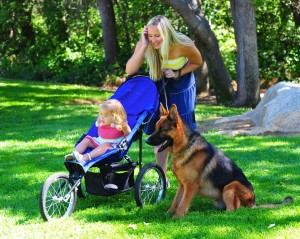Socialization: Cornerstone to Success
One of the cornerstones to having a well-behaved, well-trained dog is proper socialization as a puppy. Next to genetics, socialization is the single greatest influence on determining the future mental health and stability of your dog. Even in a pup with a solid genetic heritage, lack of socialization can create a dog that is uncertain in new surroundings; in a dog with a weak genetic heritage, lack of socialization can greatly compound any genetic shyness, fearfulness, and weak nerves, creating a nightmare of a dog who can become a liability.
By the time a puppy is 16 weeks old (4 months), that crucial window for socialization with the world at large is already closing. This is the age by which a young puppy learns what is safe and normal, and what is suspicious and to be avoided. Thus, it is very important that puppies receive as many safe, positive experiences with the world they will be living in by this point in time.
“But wait! The vet says to wait until the dog has had all its shots!” From a medical standpoint, this is sound advice: protect your dog from encountering diseases like distemper and parvovirus before he has immunity to these diseases. But from a social and mental health standpoint, sequestering a puppy at home until five or six months of age is completely devastating. Thankfully, you can still socialize your puppy carefully without putting him at high risk for disease.
First, avoid disease “hot spots” like dog parks, pet stores, the floor at the vet’s office, and any areas where high numbers of dogs of unknown health histories have urinated or defecated (i.e. communal potty areas). Second, focus on creating safe and positive experiences with a variety of people. You want your puppy to be confident in new environments with new sounds and new people. Invite trusted family, friends, and neighbors to visit your puppy in your home. As he gets a little older, take him outside and carefully expose him to different surfaces: carpet, concrete, wood, slick tile, shiny floors, metal, grass, gravel, etc. Teach him to ride in the car or in his crate, and take him through drive-thru windows, to the post office, to a coffee shop, or to Home Depot. Sit outside a coffee shop or grocery store with your puppy, letting him watch all the different people as they come and go. Always bring lots of treats to reward and reinforce good behavior, or to redirect unwanted puppy barking or biting. The more positive experiences the young puppy has, the more well-adjusted he will be later on, and the more capable he will be of handling stress.
Socialization should never completely stop. Even with our young family protection dog prospects and adult executive protection dogs, we will continue to bring them out and about with us to socialize them with the world outside our homes. It is important to continually expose dogs to the normal goings-on outside the house. Continuing to periodically socialize your adult dog will also help your dog become more involved in your life and your family, and will help him feel more included in his ‘pack’.
Happy socializing,
CK




Thanks Carissa,
Fun to read the article. Glory, our GSD, is very excited when she gets out into the world. She is 6 months already but I don’t know what socializing she did before. She does not bark but just gets excited. She only barks when she cannot play and sniff with the other dogs. Any suggestions.